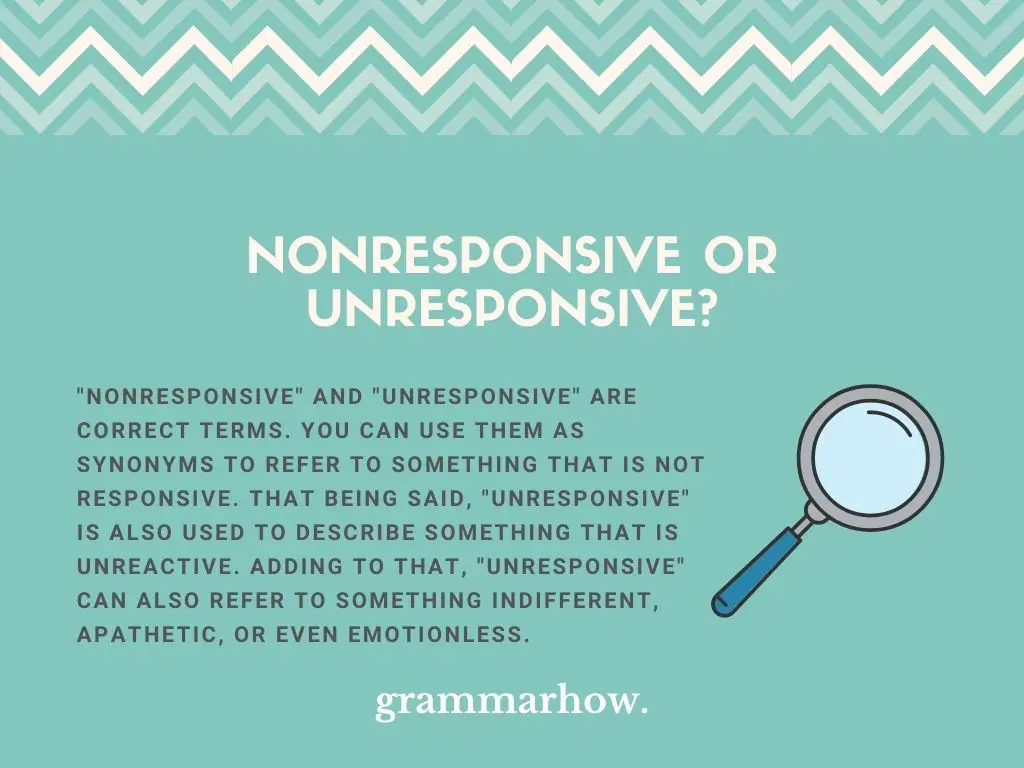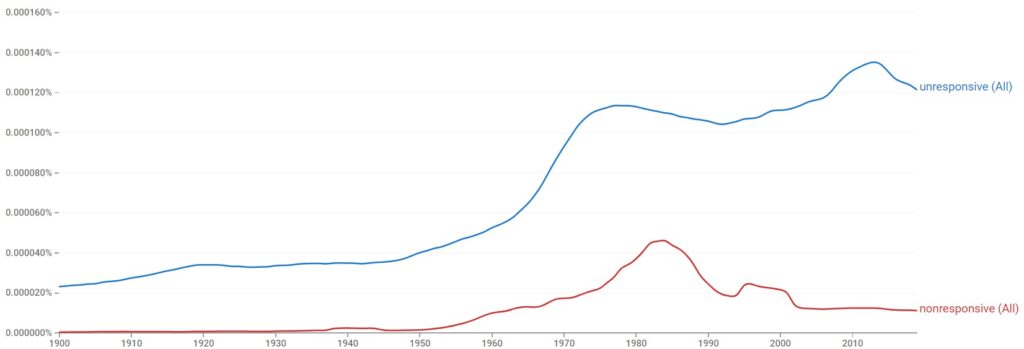“The system is nonresponsive.” “The treatment is unresponsive.” You’ve heard these expressions before for sure. However, do you know when to use each of them correctly? Moreover, do they mean the same? What’s the difference between them? Read on, all answers are just some paragraphs away.
Nonresponsive or Unresponsive – Which Spelling Is Correct?
“Nonresponsive” and “unresponsive” are correct terms. You can use them as synonyms to refer to something that is not responsive. That being said, “unresponsive” is also used to describe something that is unreactive. Adding to that, “unresponsive” can also refer to something indifferent, apathetic, or even emotionless.

The use of “nonresponsive” and “unresponsive” in colloquial English is that of synonyms; thus, they are completely interchangeable. Still, “unresponsive” covers more ground than “nonresponsive” because it can be used to refer to something when it’s unreactive, apathetic, indifferent, or lacking emotions.
Therefore, the use of these words is interchangeable as long as they’re used to talk about something that’s not responsive. For the rest of the meanings cited above, the only suitable term is “unresponsive”.
Nonresponsive
“Nonresponsive” is an adjective used to describe something that is not reacting to changes, instructions, questions, or treatments. You might also find it spelled with a hyphen: non-responsive. Nevertheless, the hyphen doesn’t change the meaning; they are alternative ways to write the same word.
Indeed, taking a look at what the Cambridge Dictionary has to add to this definition, we find they spell it with a hyphen “non-responsive”. On the other hand, the Merriam-Webster Dictionary spells it without the hyphen. In both cases, these prestigious institutions define the word as an adjective for things that don’t react or respond.
Let’s see how to use “nonresponsive” in a sentence:
- The system was hacked and became nonresponsive.
- We had a problem with the scheduled deliveries and the company is nonresponsive to our messages.
- My boyfriend was nonresponsive when I asked him if he lied to me.
- Doctors gave my grandma all sorts of painkillers, but she is nonresponsive to the treatment.
- His body collapsed and became nonresponsive straight away.
- Nonresponsive organizations make me mad very quickly. I rang them 11 times this morning.
Unresponsive
“Unresponsive” is a synonym for “nonresponsive”. Both terms refer to something that doesn’t respond to any stimuli. That being said, the word “unresponsive” can also be used to talk about something that is apathetic, emotionless, or indifferent to any spur.
According to the Cambridge Dictionary, the word “unresponsive” can also be used to talk about something or someone who doesn’t respond the way it was supposed or satisfactorily according to the demands. In the same vein, it can be used to say that something or someone is not responsive for being ill or unconscious.
Let’s see how to use “unresponsive” in a sentence:
- I asked her out but she has been unresponsive since Saturday.
- Politicians have been unresponsive to the community’s demands; it’s time to do something about it!
- The patients underwent a series of experiments but were completely unresponsive to them.
- Being unresponsive to the instructions given was irresponsible of you.
- Sometimes parents may be unresponsive to their own son’s needs.
- When my boss becomes unresponsive to my demands I just send an email to his boss and he comes to my office right away.
- When she is this unresponsive I tend to get bored and my mind wanders away.
Which Is Used the Most?
To verify which one of these adjectives is used the most, we checked this excellent tool: Google Ngram Viewer.

According to Google, the term nonresponsive started being used in the 1930s and enjoyed a popularity peak in the mid-1980s. In the last twenty years, though, the nonresponsive curve has flattened, indicating that is not commonly used.
“Unresponsive”, on the other hand, was already being used in the 1900s and enjoyed an uninterrupted positive trend until 2013, when it started a negative trend that continues to this day.
Final Thoughts
Although “nonresponsive” and “unresponsive” are synonyms, and mean that something or someone doesn’t respond to stimuli, the word “unresponsive” has a broader scope of application. Indeed, you can also use it to refer to something or someone as apathetic, indifferent, or emotionless.

Martin holds a Master’s degree in Finance and International Business. He has six years of experience in professional communication with clients, executives, and colleagues. Furthermore, he has teaching experience from Aarhus University. Martin has been featured as an expert in communication and teaching on Forbes and Shopify. Read more about Martin here.
